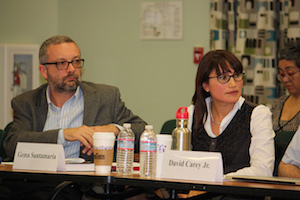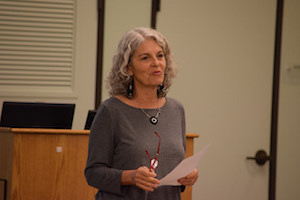
One of Mexico’s top human rights activists participated in a robust panel discussion at UC San Diego on violence and human rights, where the conversation centered on the September 2014 disappearance of 43 students in Mexico that has highlighted continued corruption within the government.
Abel Barrera Hernandez, anthropologist and founder of the Tlachinollan Center for Human Rights of the Mountain, joined academics, journalists and an attentive audience via Skype during the two-day conference “Citizenship, Security and Human Rights in Mexico and Central America.” The conference was organized by the Center for U.S.-Mexican Studies (USMEX) at the School of International Relations and Pacific Studies and UC San Diego’s Eleanor Roosevelt College Human Rights Program.
“The disappearance of the students has galvanized international attention around the challenges that Mexico faces in regards to corruption, insecurity and human rights,” said Melissa Floca, USMEX associate director. “Abel Barrera Hernandez’s work, and the work of other civil society organizations, is especially important as Mexican society looks for solutions to these problems. Our work is greatly enriched by insight from activists, and we hope academic work on these issues can also support effective responses from policymakers and civil society.”
Located in the same state as the missing students, the Tlachinollan human rights center has played a pivotal role in supporting the students’ families in their search to discover the whereabouts and, possibly, the last moments of the students’ lives.
The Teachers’ College of Ayotzinapa students went missing in Iguala, Guerrero and there has been much speculation about government participation in their disappearance. The Mexican government’s official investigation indicates that the students were detained by municipal police and turned over to Guerreros Unidos, an active criminal organization, and executed.
During the roundtable conducted in Spanish, Barrera Hernandez provided an update on recent events and raised deep concerns over the divide between the federal investigators and the families of the missing students, emphasizing that the government has effectively ended their investigation by insisting the students were killed by Guerreros Unidos on orders from the Iguala mayor. Barrera Hernandez pointed out that the victims’ families have not received definitive proof of the government’s findings and that the families are continuing their search for answers with support from community organizations including the Tlachinollan human rights center.
 Founded in 1994, the Tlachinollan center became active in reporting citizen abuses at the hands of the Mexican army, leading, in one case, to guilty verdicts against the military on rights violations toward two indigenous women. Because of the work, organization members testified before a United States Congress human rights commission on military abuses in Guerrero, and Barrera Hernandez was given the Robert F. Kennedy Human Rights Award and Amnesty International’s Human Rights Award.
Founded in 1994, the Tlachinollan center became active in reporting citizen abuses at the hands of the Mexican army, leading, in one case, to guilty verdicts against the military on rights violations toward two indigenous women. Because of the work, organization members testified before a United States Congress human rights commission on military abuses in Guerrero, and Barrera Hernandez was given the Robert F. Kennedy Human Rights Award and Amnesty International’s Human Rights Award.
Award-winning journalist Marcela Turati and Centro de Investigaciones y Estudios Superiores professor Maria Teresa Sierra joined Barrera Hernandez in the discussion, which was led by Stanford University professor and former USMEX director Alberto Diaz-Cayeros. Turati, who has closely covered the students’ disappearance and written extensively on human rights and drug-related violence, said the Ayotzinapa case shows what many already knew: disappearances in Mexico, many of which involve participation by government officials, are common and have become accepted as normal.
The media attention, however, could have a positive change, Sierra said. She argued the ongoing political repression in Guerrero has given rise to many community organizations that fight for social justice — like Tlachinollan — with the ability to mobilize citizens like never before.
The roundtable was one part of the larger conference that addressed several pressing issues around citizenship and security in parts of Latin America, including the mass migration of women and children from Central America to the U.S. The conference began with student fieldwork presentations by the Blum Cross-Border Initiative of the UCSD Center on Global Justice, and research by students from several Tijuana-based universities. Presenters at two academic panels later met to discuss the publication of their own work presented at the conference, including Elana Zilberg of UC San Diego, and current and former USMEX fellows Gema Santamaria, Pablo Piccato and Lynn Stephen. UC San Diego literature professor and award-winning, cross-border novelist Cristina Rivera Garza read her work before the conference’s closing session.
“The combination of the panel discussion and Cristina’s readings makes us see how complicated the issues are,” said Nancy Postero, UC San Diego’s Human Rights Program director. “In addition, this work shows how these issues affect us all on so many different levels, from the physical to the emotional, as well as to the many bi-national policy aspects.”
Read the conference agenda (PDF), including guest speakers and panel summaries, and view the complete photo gallery.
